七年级英语下册第十单元知识点归纳_1-4
七年级下册英语第10单元知识点

七年级下册英语第10单元知识点七年级下册英语第10单元主要讲解了现在进行时和现在分词的用法。
现在进行时表示正在发生的动作,而现在分词则可以作为形容词使用,用于修饰名词或代词。
以下是详细的知识点解析:1. 现在进行时的构成现在进行时由“主语 + be动词(am, is, are) + 现在分词(-ing形式)”构成。
例如:- I am writing a letter.(我正在写信。
)- Tom is playing basketball.(汤姆正在打篮球。
)- They are watching TV.(他们正在看电视。
)2. 现在进行时的用法现在进行时表示现在正在进行的动作。
它通常与现在的时间状语一起使用。
例如:- She is studying English now.(她现在正在学英语。
)- We are having dinner at the moment.(我们现在正在吃晚餐。
)- He is playing chess with his friend.(他正在和他的朋友下棋。
)3. 现在分词的构成现在分词的构成方式为:动词原形 + -ing。
例如:- write → writing- play → playing- study → studying4. 现在分词的用法除了作为现在进行时的一部分外,现在分词还可以作为形容词使用,用于修饰名词或代词。
例如:- The singing bird is beautiful.(那只唱歌的鸟很美。
)- The running horse is strong.(那匹飞奔的马很强壮。
)- The smiling girl is very friendly.(那个微笑的女孩很友好。
)5. 特殊用法现在分词还有一些特殊的用法,例如:- 作为主语或宾语补足语现在分词可以作为主语或宾语补足语,用于进一步说明主语或宾语的情况。
例如:- Swimming is good exercise.(游泳是一项良好的锻炼。
七年级下英语Unit 10 知识点归纳
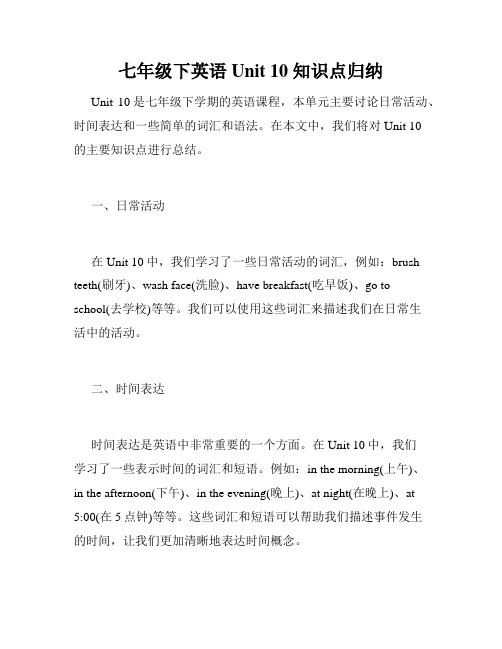
七年级下英语Unit 10 知识点归纳Unit 10是七年级下学期的英语课程,本单元主要讨论日常活动、时间表达和一些简单的词汇和语法。
在本文中,我们将对Unit 10的主要知识点进行总结。
一、日常活动在Unit 10中,我们学习了一些日常活动的词汇,例如:brush teeth(刷牙)、wash face(洗脸)、have breakfast(吃早饭)、go toschool(去学校)等等。
我们可以使用这些词汇来描述我们在日常生活中的活动。
二、时间表达时间表达是英语中非常重要的一个方面。
在Unit 10中,我们学习了一些表示时间的词汇和短语。
例如:in the morning(上午)、in the afternoon(下午)、in the evening(晚上)、at night(在晚上)、at 5:00(在5点钟)等等。
这些词汇和短语可以帮助我们描述事件发生的时间,让我们更加清晰地表达时间概念。
三、简单的词汇和语法在Unit 10中,我们学习了一些简单的词汇和语法。
例如:weekend(周末)、weekday(工作日)、every day(每天)、everyweek(每周)、am(上午)、pm(下午)等等。
这些词汇和语法可以帮助我们更好地描述时间和频率。
除此之外,在Unit 10中我们还学习了以can和should为代表的情态动词。
可以用can来表达某件任务可以完成,用should来表达某件任务应该完成。
在总结中,我们深入研究了Unit 10的主要知识点。
在英语的学习中,我们需要不断地复习和练习,以提高我们的英语水平。
祝愿每个同学都能在英语的学习过程中获得更多的收获和发展。
七下英语10单元知识点总结

七下英语10单元知识点总结1.表示目的的单词:so that, in order to, for the purpose of, withthe aim of, to name just a few。
2.表示时间的单词:while, during, as soon as, before, after等。
3.形容词的比较级和最高级的变形规则:一般情况下,单音节和少部分双音节形容词变形规则是在尾部加-er和-est;多数双音节或多音节形容词前面加more和most。
4.动词的“be + Ving”形式,表示正在进行或持续的动作。
5.形容词和副词的区别:形容词用来描述人、物的特点、性质或状态;副词用来描述人、物的动作或行为方式。
6.围绕“看电影”而展开的词汇:film, movie, cinema, ticket, screen, director, actor, actress, plot, screenwriter, audience等。
7.感官动词和形容词的使用:see, hear, taste, smell, feel等动词;bright, dark, loud, soft, sweet, sour, bitter, salty, hot, cold等形容词。
8.问路时常用的句型及表述:Can you tell me/how to getto…/Excuse me/Where is…/Is it far from here/Which way should I go等。
9.口语交流中常见的缩略语:I’m, you’re, he’s, she’s, it’s, we’re,they’re等。
10.组建复合词的规则:通常由名词、形容词和动词组合而成,也可以由名词和名词、名词和形容词、名词和动词组合,例如:shopping mall, ice cream, sunflower等。
人教版七年级下册英语Unit 10 语法知识归纳
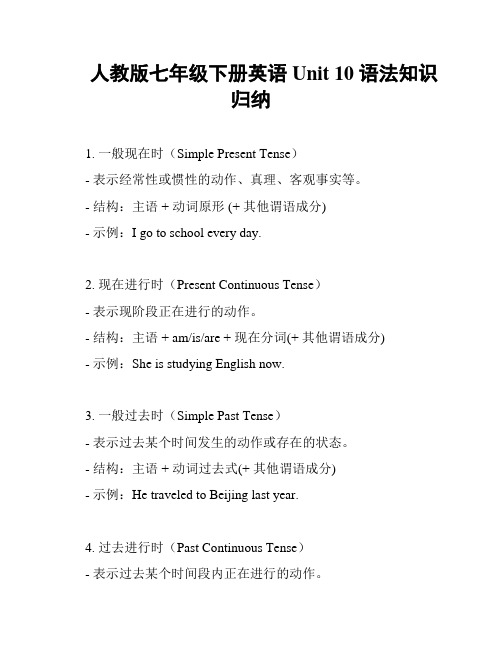
人教版七年级下册英语Unit 10 语法知识归纳1. 一般现在时(Simple Present Tense)- 表示经常性或惯性的动作、真理、客观事实等。
- 结构:主语 + 动词原形 (+ 其他谓语成分)- 示例:I go to school every day.2. 现在进行时(Present Continuous Tense)- 表示现阶段正在进行的动作。
- 结构:主语 + am/is/are + 现在分词(+ 其他谓语成分)- 示例:She is studying English now.3. 一般过去时(Simple Past Tense)- 表示过去某个时间发生的动作或存在的状态。
- 结构:主语 + 动词过去式(+ 其他谓语成分)- 示例:He traveled to Beijing last year.4. 过去进行时(Past Continuous Tense)- 表示过去某个时间段内正在进行的动作。
- 结构:主语 + was/were + 现在分词(+ 其他谓语成分)- 示例:They were playing basketball yesterday.5. 将来时(Future Tense)- 表示将来会发生的动作或存在的状态。
- 结构:主语 + will + 动词原形(+ 其他谓语成分)- 示例:We will have a party next week.6. 助动词的用法- “do”及其变化形式可用于否定句、疑问句和强调句。
- “be”用于进行时态和被动语态。
- “have”可用于完成时态。
- 示例:She doesn't like swimming. Did you go to the park? I do like chocolate.7. 特殊疑问词的用法- 针对特定方面的问题,使用特殊疑问词进行提问。
- 示例:What is your favorite color? Where did you go on vacation?以上是人教版七年级下册英语Unit 10关于语法知识的归纳。
七年级英语下册unit10知识点

七年级英语下册unit10知识点Unit10是七年级英语下册中的一个重要单元,本单元主要涉及到的内容是形容词比较级和最高级、时间状语从句以及一些有关旅游和交通的话题。
本文将对这些知识点进行详细的介绍和解释。
一、形容词比较级和最高级1.比较级的用法形容词比较级通常用于两个人或物之间的比较。
它的构成方法是在单音节形容词后面加-er,如big-bigger,而对于多音节形容词则需要在前面加more,如beautiful-more beautiful。
除了例外单词(如good-better,bad-worse)外,大部分比较级都需要在后面加than才能完整的表示比较。
2.最高级的用法形容词最高级通常用于三个或以上的人或物之间的比较。
它的构成方法是在单音节形容词后面加-est,如tall-tallest,而对于多音节形容词则需要在前面加most,如interesting-most interesting。
通常来说,最高级也需要在前面加the才能完整的表示最高级。
3.注意点在使用比较级和最高级的时候,我们需要注意以下几点:①要根据句子的语境选择正确的形容词比较级或最高级。
②如果比较级或最高级前面有限定词(如a,an,the等),则需要加在限定词后面。
③在描述人的特征时,注意要表达恰当。
例如正确的表达是Tom is taller than me,而不是Tom is taller than I。
二、时间状语从句时间状语从句通常用于表示某个动作或事件发生的时间。
这类从句可以分为以下几种:1. before/after从句此类从句表示某个动作发生在另一个动作之前或之后,其构成方法如下:before从句:Subject + verb (simple past) + beforeAfter从句:Subject + verb (simple past) + after例如:Before I went to bed, I finished my homework.2. when从句当我们想要表示某个动作的发生时间时,可以使用when从句。
七年级下册英语unit10知识点归纳
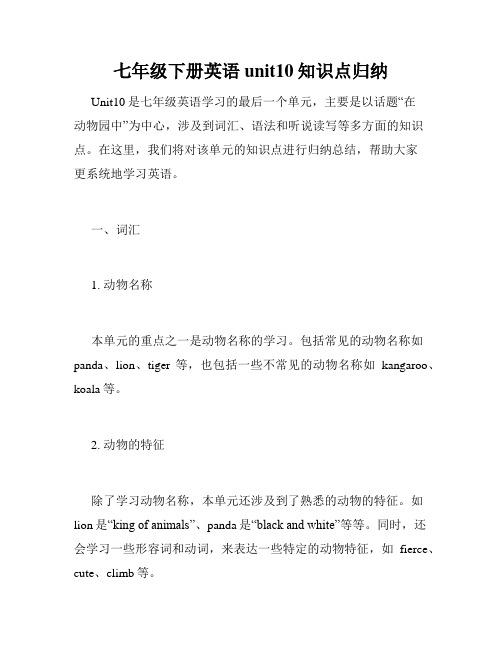
七年级下册英语unit10知识点归纳Unit10是七年级英语学习的最后一个单元,主要是以话题“在动物园中”为中心,涉及到词汇、语法和听说读写等多方面的知识点。
在这里,我们将对该单元的知识点进行归纳总结,帮助大家更系统地学习英语。
一、词汇1. 动物名称本单元的重点之一是动物名称的学习。
包括常见的动物名称如panda、lion、tiger等,也包括一些不常见的动物名称如kangaroo、koala等。
2. 动物的特征除了学习动物名称,本单元还涉及到了熟悉的动物的特征。
如lion是“king of animals”、panda是“black and white”等等。
同时,还会学习一些形容词和动词,来表达一些特定的动物特征,如fierce、cute、climb等。
3. 表示地点本单元的话题是在动物园中,因此会涉及到一些表示地点的词汇,如zoo、cage、aquarium等。
4. 一些单词和短语本单元还会学习一些比较常见的单词和短语。
如feed、hear、see等等。
二、语法1. there be句型本单元的语法重点之一是there be句型。
这是一种用于表示“某处有……”的句型,如There is a zoo in our town.、There are many animals in the zoo.学习了这个句型,就可以更好地描述动物园中的情境。
2. 物主代词此外,在本单元中还会学习到物主代词。
如my、your、his、her等。
这些代词可以用来表达“我的”、“你的”、“他的”、“她的”等等。
三、听说读写1. 听力在本单元的听力中,会出现不少与动物有关的对话和描述。
需要学生们能够听懂、理解并回答问题。
此外,本单元还会涉及到一些数字、颜色等等。
2. 说话在学习本单元的单词和短语后,学生们需要能够用英语进行简单的对话和交流,如询问动物的名称、特征等等。
3. 阅读在本单元阅读中,学生们将会看到一些动物园的介绍、地图等等。
人教版七年级英语下册第十单元知识点汇总总结

人教版七年级英语下册第十单元知识点汇总总结01、重点短语1. would like sth. 想要某物2. would like to do sth. 想要做某事3. put on 穿上,戴上4. take one's order 点菜5. in the beef noodles 在牛肉面里6. mapo tofu with rice麻婆豆腐外带米饭7. what kind of noodles 什么种类的面条8. a large bowl of noodles 一大碗面条9. a medium bowl of noodles 一中碗面10. a small bowl of noodles 一小碗面条11. what size 什么尺寸12. beef noodles with carrots带有胡萝卜的牛肉面13. green tea 绿茶14. orange juice 橙汁15. around the world 世界各地16. in different countries 在不同的国家17. birthday cakes with candles带蜡烛的生日蛋糕18. the birthday person 寿星19. make a wish 许愿20. blow out the candles 吹灭蜡烛21. in one go 一口气,一次性的22. come true 实现23. get popular 变得流行,受欢迎24. long noodles 长寿面25. cut up 切碎/断26. a symbol of long life 长寿的象征27. be different from 与......不同28. be the same 一样的29. bring good luck to sb. 带给某人幸运30. have different kinds of …有不同种类的......02、重点句子Grammar Focus 句子1. What kind of noodles would you like?你想要哪种面条?2. I’d like beef noodles, please.我想要牛肉面。
最全面人教版七年级下册英语第十单元知识点归纳总结
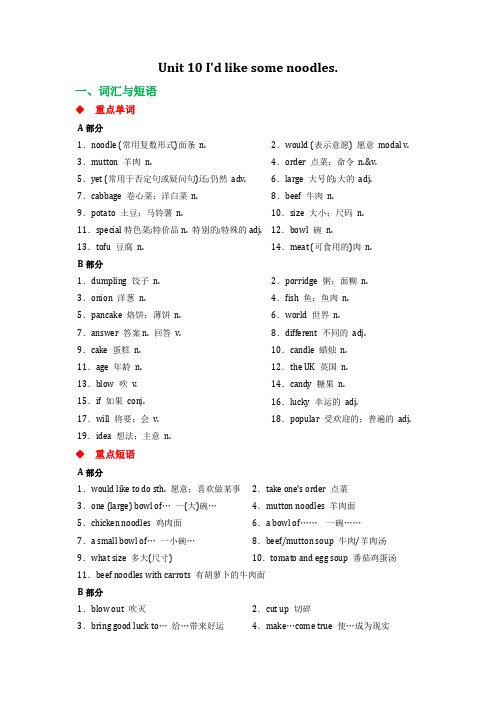
Unit 10 I'd like some noodles.一、词汇与短语◆重点单词A部分1.noodle (常用复数形式)面条n.2.would (表示意愿) 愿意modal v. 3.mutton 羊肉n.4.order 点菜;命令n.&v.5.yet (常用于否定句或疑问句)还;仍然adv.6.large 大号的;大的adj. 7.cabbage 卷心菜;洋白菜n.8.beef 牛肉n.9.potato 土豆;马铃薯n.10.size 大小;尺码n. 11.special特色菜;特价品n. 特别的;特殊的adj.12.bowl 碗n.13.tofu 豆腐n.14.meat (可食用的)肉n.B部分1.dumpling 饺子n.2.porridge 粥;面糊n. 3.onion 洋葱n.4.fish 鱼;鱼肉n.5.pancake 烙饼;薄饼n.6.world 世界n.7.answer 答案n. 回答v.8.different 不同的adj.9.cake 蛋糕n.10.candle 蜡烛n.11.age 年龄n.12.the UK 英国n.13.blow 吹v.14.candy 糖果n.15.if 如果conj.16.lucky 幸运的adj.17.will 将要;会v.18.popular 受欢迎的;普遍的adj. 19.idea 想法;主意n.◆重点短语A部分1.would like to do sth. 愿意;喜欢做某事2.take one's order 点菜3.one (large) bowl of…一(大)碗…4.mutton noodles 羊肉面5.chicken noodles 鸡肉面6.a bowl of……一碗……7.a small bowl of…一小碗…8.beef/mutton soup 牛肉/羊肉汤9.what size 多大(尺寸)10.tomato and egg soup 番茄鸡蛋汤11.beef noodles with carrots 有胡萝卜的牛肉面B部分1.blow out 吹灭2.cut up 切碎3.bring good luck to…给…带来好运4.make…come true 使…成为现实5.on one's birthday 在某人生日那天6.in different countries 在不同的国家7.green tea 绿茶8.the number of……的数量9.one's age 某人的年龄10.make a wish 许愿11.around the world 全世界12.in the UK 在英国13.all the candles 所有的蜡烛14.come true 实现15.in one go 一口气16.a birthday cake 一块生日蛋糕17.put…into…把…放进…里18.in China 在中国19.get popular受欢迎;流行20.many people 许多人21.eat very long noodles 吃长寿面22.cut up 切碎23.a symbol of……的象征24.long life 长寿25.Chinese people 中国人26.good luck 好运27.the same 一样28.ask for要求得到29.for five yuan以五元的价格30.birthday cakes with candles带有蜡烛的生日蛋糕◆重点句子A部分1.—What size would you like? 你们想要多大碗的?—I'd like a large bowl, please. 就来大碗的吧。
最新人教版七年级下Unit10知识梳理

Unit10 知识梳理1.would like想要would like sth.想要某事Would like to do sth. 想要做某事would like sb. to do sth.想要某人做某事2. take/have one’s order 点菜order sb(not)to do sth 命令某人做某事3. beef/mutton soup 牛肉/羊肉汤chicken noodles 鸡肉面4. special 特色菜复数specials5. a/one bowl of …一碗……a large bowl of.. 一大碗a medium bowl of.. 一中碗a small bowl of... 一小碗Would you like a large bowl? 你想要一个大碗的吗?Yes, please. 好吧。
No, thanks.不,谢谢6.what size多大(尺寸)What size would you like? 你想要多大的? I’d like a medium bowl, please. 我想要一个中碗的。
7. mapo tofu with rice 带米饭的麻婆豆腐8. beef noodles with carrots 有胡萝卜的牛肉面9. tomato and egg soup 番茄鸡蛋汤名词修饰名词,修饰作用的名词用单数10. what kind 什么种类What kind of noodles would you like? 你想要哪种面条?I ‘d like beef noodles, please.我想要牛肉面。
11. green tea 绿茶12.仍然,还:still(肯定句)yet(疑问句、否定句)13. orange juice 橘汁14. around the world= all over the world 世界各地15. birthday cake 生日蛋糕16. on one's birthday 在某人生日那天17. in different countries 在不同的国家副词differently 名词difference18. birthday cakes with candles带有蜡烛的生口蛋糕19. the number of表示“……的数量”,后面接可数名词复数。
人教版七年级英语下册Unit 10单元考点知识汇总

人教版七年级英语下册Unit 10单元考点知识汇总Unit 10 I’d like some noodles.1.名词可分为可数名词和不可数名词(不可数名词作主语. 谓语动词用单数)。
可数名词又分单数和复数. 可数名词复数的变化规则:○1一般+s;○2以-s,-x,-ch,sh结尾的名词+es;○3辅音+y,把y变i,再+es;○4以-o结尾的. 有生命的+es(hero—heroes;tomato—tomatoes;potato—potatoes);无生命的+s;⑤以f. fe 结尾的名词. 改f. fe为v+es(leaf—leaves;knife—knives)⑥单复数同形:sheep. deer.⑦不规则变化:man—men;woman—women;child—children;foot—feet;tooth—teeth等2. (1)would like sth. 想要某物(2)Would you like some …? 你想要一些……吗?—Yes, please./ —No, thanks.(3)would like to do sth. “想要做某事”。
(4)Would you like to do…? 你愿意去做……吗?—Yes, I’d like / love to./—I’d like/ love to. But I’m too busy.(5)would like sb to do sth “想要某人做某事”。
3. May I take your order? =May I have your order ? 你要点菜吗?Order: 名词/动词(1)点菜(2)命令(1)order food take/ have one’s order(2)In order to为了(3)In the order按顺序(4)Order/ book a room 预定房间(5)Order sb(not)to do sth命令某人(不)做……4. special和especialspecial特别的人或事物. 特别的. 特殊的.specials特色菜;specially专门地. 特地especially特别. 尤其5.仍然. 还:still(肯定句)yet(疑问句、否定句)6. one bowl of:一碗…….two bowls of:两碗……7. what size(+n)would you like?你喜欢什么尺寸(型号)的?Large/ medium/ small(修饰型号或者尺寸)8. what kind of….?哪一种a kind of 一种different kinds of不同种类的all kinds of各种各样的be kind to sb. 对某人友好的9. beef noodles 牛肉面women teachers女教师们10. 大:big 体格大、笨重→small. little 形容具体的人或物Huge物体体积巨大=very bigLarge物体面积、空间、范围、数量大→small 不修饰人Great重大事件或行为. 伟大. 具有感情色彩11. 肯定句中表并列用and否定句、疑问句中表并列用or13.around the world= all over the world 全世界. 世界各地14. on one’s birthday 在某人的生日on their birthdayon Tom’s birthday15. in different countries 在不同的国家16. ask----answerthe answer to ……….的答案17. (1)the number of表示“……的数量”. 后面接可数名词复数。
七年级英语下册第十单元知识点总结
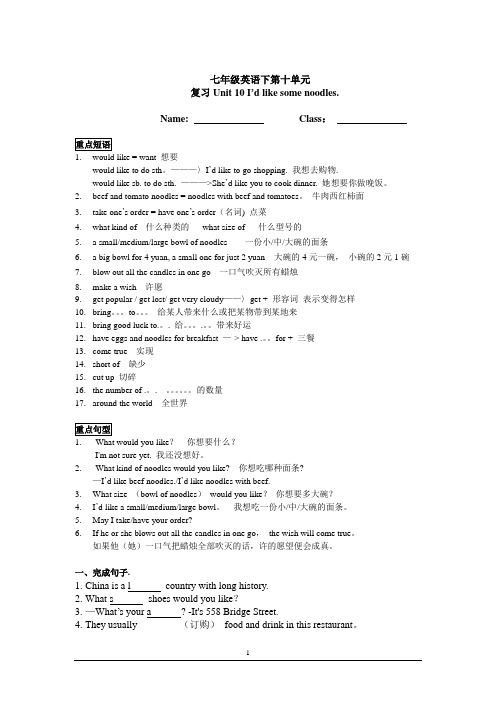
七年级英语下第十单元复习Unit 10 I’d like some noodles.Name: Class:1.would like = want 想要would like to do sth。
———〉I’d like to go shopping. 我想去购物.would like sb. to do sth. ———>She’d like you to cook dinner. 她想要你做晚饭。
2.beef and tomato noodles = noodles with beef and tomatoes。
牛肉西红柿面3.take one’s order = have one’s order(名词) 点菜4.what kind of 什么种类的what size of 什么型号的5. a small/medium/large bowl of noodles 一份小/中/大碗的面条6. a big bowl for 4 yuan, a small one for just 2 yuan 大碗的4元一碗,小碗的2元1碗7.blow out all the candles in one go 一口气吹灭所有蜡烛8.make a wish 许愿9.get popular / get lost/ get very cloudy——〉get + 形容词表示变得怎样10.bring。
to。
给某人带来什么或把某物带到某地来11.bring good luck to.。
. 给。
.。
带来好运12.have eggs and noodles for breakfast —-> have .。
for + 三餐e true 实现14.short of 缺少15.cut up 切碎16.the number of .。
. 。
的数量17.around the world 全世界1.-What would you like?你想要什么?-I'm not sure yet. 我还没想好。
人教版七年级下册英语Unit 10 语法重点总结

人教版七年级下册英语Unit 10 语法重点总结一、一般过去时一般过去时用来描述过去发生的动作或存在的状态。
下面是一般过去时的用法和结构:用法- 用于描述过去的经历、事件、惯等- 动词的过去式通常是加上-ed,但也有一些特殊的变化规则结构- 肯定句:主语 + 动词过去式 + 其他- 否定句:主语 + 动词过去式 + not + 其他- 疑问句:助动词(did) + 主语 + 动词原形 + 其他- 特殊疑问句:疑问词 + 助动词(did) + 主语 + 动词原形 + 其他二、时间状语时间状语可以帮助我们表达动作发生的时间。
下面是一些常用的时间状语:- yesterday(昨天)- last week(上周)- ago(以前)- in 1990(在1990年)- just now(刚才)- this morning(今天早上)- etc.三、比较级和最高级比较级和最高级用于比较两个或多个人或物的程度、数量等。
下面是比较级和最高级的用法和结构:用法- 比较级用于比较两个人或物的程度、数量等- 最高级用于比较三个或三个以上人或物的程度、数量等结构- 比较级:形容词或副词的比较级 + than + 被比较的人或物- 最高级:形容词或副词的最高级 + in/of + 所有被比较的人或物四、情态动词情态动词用于表示说话人对某种动作或状态的看法、推测、意愿、能力等。
下面是一些常用的情态动词:- can(能)- could(过去能)- may(可以)- might(可能)- must(必须)- should(应该)- would(愿意)五、被动语态被动语态用于表示动作的接受者或者受事者是谁。
下面是被动语态的用法和结构:用法- 主动语态:主语 + 动词 + 宾语- 被动语态:宾语 + be + 过去分词 +(by + 施动者)结构- 肯定句:宾语 + be + 过去分词 +(by + 施动者)- 否定句:宾语 + be not + 过去分词 +(by + 施动者)- 疑问句:Be + 宾语 + 过去分词 +(by + 施动者)以上是人教版七年级下册英语Unit 10的语法重点总结,希望对你的学习有所帮助。
新目标英语七年级(下)Unit_10知识要点归纳

知1.—Whatkind ofnoodleswould you like?—I’d like beef and tomato noodles,please.———你想要什么种类的面?———我想要牛肉番茄面,谢谢。
2.—What size would you like?—I’d like a small/medium/large bowl.———你想要多大(碗)的?———我想要小/中/大碗的。
3.—Would you like any drinks?—One large green tea.———你想来点喝的么?———一杯大杯绿茶。
4.Butweareshortoffish.但是我们缺鱼。
【重点词汇】noodle.面条beef牛肉potato土豆;马铃薯special特色菜;特价品.特殊的would.(表示意愿)愿意large.大号的;大的order.&点菜;命令size.大小;尺寸bowl.碗meat.(可食用的)肉dumpling.饺子fish.鱼;鱼肉pancake.烙饼;薄饼world.世界answer.答案.回答different.不同的cake.蛋糕candle.蜡烛age.年龄blow.吹candy.糖果popular受欢迎的;普遍的lucky.幸运的idea想法;主意would like想要beef noodles牛肉面tomato and egg soup西红柿蛋汤a large/medium/small bowl大碗/中碗/小碗mutton noodles羊肉面green tea绿茶blow out吹灭cut up切碎make a wish许愿what size什么尺寸【重难点句子】32Copyright©博看网. All Rights Reserved.。
人教版初一年级英语下册第十章节知识点总结归纳

人教版初一年级英语下册第十章节知识点总结归纳人教版初一英语下册第十章节知识点总结归纳本章节主要介绍了关于购物的相关知识。
以下为章节要点总结:一、语音知识- 本章节的语音重点为:/ð/,/s/,/z/,/ʃ/,/ʒ/,/tʃ/,/dʒ/,/e/。
- 相关单词需注意正确发音,如 clothes /kləʊðz/。
二、词汇与短语1. 常用词汇:- buy v.购买- sell v.出售- price n.价格- shop n.商店- money n.钱- yuan n.元(人民币)2. 常用短语:- go shopping 去购物- for sale 出售- on sale 打折销售- how much 多少钱- too expensive 太贵了三、语法知识1. 物主代词:- 形容词性物主代词:my,your,his,her,its,our,their- 名词性物主代词:mine,yours,his,hers,its,ours,theirs2. that引导的定语从句:- that在定语从句中作连接代词,用来连接定语从句与先行词- who/which也可用来引导定语从句,但that更常用四、交际用语- Excuse me询问别人并向其道歉,如 Excuse me, how much is this T-shirt?- Can/Could I help you? 问别人是否需要帮助,如 Can I help you find something?- What can I do for you? 询问别人需要什么帮助,如 What can I do for you?以上为本章节的知识点总结归纳,希望能对大家的英语学习有所帮助。
七年级英语下册Unit10知识点总结

七年级英语下Unit10知识点归纳与总结Unit 10 I’d like some noodles?一、重要词汇1、special n.特色菜、特价品;adj.特别的、特殊的;specially adv.特别地、专门地;2、differnt adj.不同地;differntly adv.不同地;difference n.区别、差异;3、lucky adj.幸运的;luck n.幸运;luckily adv.幸运地;unlucky不幸的;unluckily不幸地;4、potato n.土豆,复数:potatoes; tomato n.西红柿,复数:tomatoes;二、重要短语1、would like sth 想要某物;2、order food点食物,点菜;3、beef noodles 牛肉面;4、beef and carrot noodles 牛肉胡萝卜面;5、in the beef noodles 在牛肉面里;6、Special 1 特色菜1;7、what kind of noodles 哪种面条; 8、a large bowl of noodles 一大碗面;9、a medium bowl of noodles 一中碗面; 10、a small bowl of noodles 一小碗面;11、take one’s order 点菜; 12、in the beef soup 在牛肉汤里;13、one bowl of beef soup 一碗牛肉面; 14、what size 多大(碗),什么尺寸;15、that’s right 对,那是正确的; 16、in the tomato and egg soup 在西红柿鸡蛋汤里;17、beef noodles with carrots 胡萝卜牛肉面; 18、green tea 绿茶;19、orange juice 橘子汁; 20、birthday food 生日食物;21、around the world世界各地; 22、on one’s birthday 在某人的生日;23、be different 不同; 24、be different from 与不同;25、in different countries 在不同的国家; 26、birthday cake with candles 有蜡烛的生日蛋糕;27、the number of... ...的数量; 28、the person’s age 这个人的年龄;29、make a wish 许愿; 30、blow out the candles 吹灭蜡烛;31、in one go一次性的,同一次; 32、come true 实现;33、put...in... 把...放进...; 34、get popular 受欢迎,流行;35、eat long noodles 吃长寿面; 36、cut up 切碎;37、a symbol of long life 长寿的象征; 38、be the same 相同;39、bring good luck to sb 给某人带来好运; 40、have different kinds of 有不同种类的;41、be short of短缺,缺少; 42、put on 带上,穿上;43、don’t worry 别着急;三.重点句子1.--What would you like ? --I’m not sure yet. yet: 还,仍然。
七年级下10单元知识点
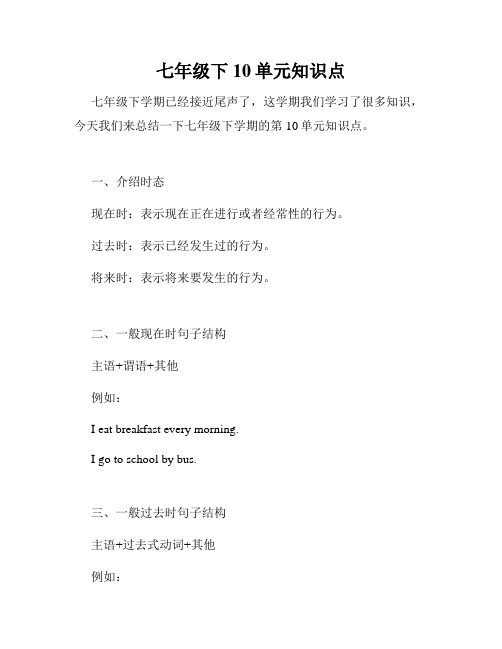
七年级下10单元知识点七年级下学期已经接近尾声了,这学期我们学习了很多知识,今天我们来总结一下七年级下学期的第10单元知识点。
一、介绍时态现在时:表示现在正在进行或者经常性的行为。
过去时:表示已经发生过的行为。
将来时:表示将来要发生的行为。
二、一般现在时句子结构主语+谓语+其他例如:I eat breakfast every morning.I go to school by bus.三、一般过去时句子结构主语+过去式动词+其他例如:Yesterday I ate pizza for dinner.Last weekend I went to the movies.四、将来时句子结构主语+will+谓语+其他例如:I will visit my grandparents next weekend.We will have a party tomorrow.五、基数词和序数词基数词:表示数量或者数量关系的数字,例如1、2、3、4等等。
序数词:表示顺序关系的数字,例如第1、第2、第3等等。
六、名词的复数形式大部分名词复数形式是在词尾加s,但也有一些特别规则,例如以s、x、ch、sh结尾的名词,在词尾加es;以y结尾的名词,变y为i,再加es;不规则名词需要记忆。
七、动词的三种形态原形态:表示某个动词的最基本形式,例如eat。
过去式:表示某个动词发生在过去的时候,例如ate。
过去分词:用于完成时态或者被动语态,例如eaten。
八、情态动词情态动词是用来表示看法、意愿、建议等等,没有时态和人称的变化,需要根据句子的语气来给出判断,例如can、should、must等等。
以上便是七年级下学期的第10单元知识点的总结,希望这些知识可以成为我们日常学习和生活的一部分,帮助我们更好地理解英语。
七年级下英语十单元知识点
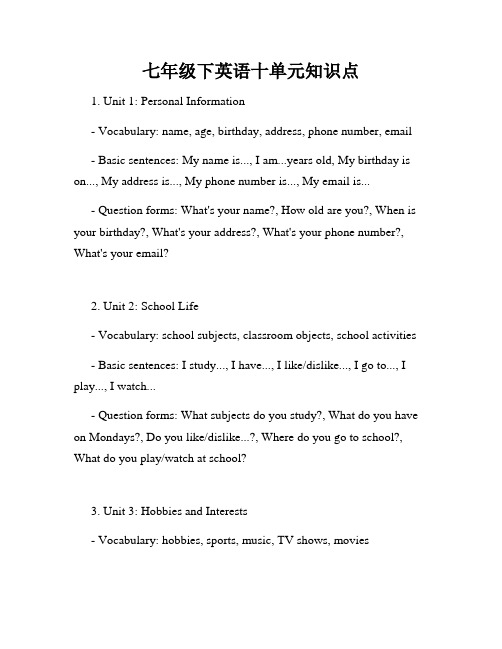
七年级下英语十单元知识点1. Unit 1: Personal Information- Vocabulary: name, age, birthday, address, phone number, email- Basic sentences: My name is..., I am...years old, My birthday is on..., My address is..., My phone number is..., My email is...- Question forms: What's your name?, How old are you?, When is your birthday?, What's your address?, What's your phone number?, What's your email?2. Unit 2: School Life- Vocabulary: school subjects, classroom objects, school activities- Basic sentences: I study..., I have..., I like/dislike..., I go to..., I play..., I watch...- Question forms: What subjects do you study?, What do you have on Mondays?, Do you like/dislike...?, Where do you go to school?, What do you play/watch at school?3. Unit 3: Hobbies and Interests- Vocabulary: hobbies, sports, music, TV shows, movies- Basic sentences: I like..., I don't like..., My favorite...is..., I play..., I listen to..., I watch...- Question forms: What are your hobbies?, Do you like...?, What's your favorite...?, Do you play any sports?, What kind of music do you listen to?, What TV shows/movies do you watch?4. Unit 4: Daily Routines- Vocabulary: wake up, get up, brush teeth, wash face, have breakfast, go to school, have lunch, do homework, have dinner, go to bed- Basic sentences: I wake up..., I get up..., I brush my teeth..., I wash my face..., I have breakfast..., I go to school..., I have lunch..., I do my homework..., I have dinner..., I go to bed...- Question forms: What time do you wake up?, What do you do after you wake up?, Do you brush your teeth in the morning or at night?, Do you wash your face before or after brushing your teeth?, What do you usually have for breakfast/lunch/dinner?, What time do you go to bed?5. Unit 5: Family- Vocabulary: family members, family tree, family activities- Basic sentences: My family members are..., My parents are..., My siblings are..., I have a big/small family, I love my family, We do...together- Question forms: Who are your family members?, What do your parents/siblings do?, Do you have a big or small family?, What do you do together as a family?6. Unit 6: Jobs and Occupations- Vocabulary: jobs, professions, responsibilities, skills- Basic sentences: My dream job is..., I want to be..., A...(job name)...does..., A good...(job name)...should have..., I am good at...- Question forms: What's your dream job?, What job do you want to have in the future?, What does a...(job name)...do?, What skills does a good...(job name)...need?, What are you good at?7. Unit 7: Places in Town- Vocabulary: places in town, locations, directions, transportation- Basic sentences: There is/are..., It's near..., It's next to..., It's in front of/behind..., I go to...by..., I usually walk/take the bus/take the subway...- Question forms: What places are there in your town/city?, Where is...?, What's near...?, What's next to...?, How do you get to...?, What transportation do you usually take?8. Unit 8: Food and Drinks- Vocabulary: food, drinks, eating habits, table manners- Basic sentences: I like/dislike..., My favorite...is..., I eat...for..., I drink...with..., I don't like to eat/drink..., It's polite/impolite to...- Question forms: What food/drinks do you like/dislike?, What's your favorite...?, What do you eat/drink for...?, What do you drink with...?, What foods/drinks don't you like?, What table manners are polite/impolite?9. Unit 9: Clothes and Shopping- Vocabulary: clothes, colors, sizes, shopping expressions- Basic sentences: I am wearing..., I like wearing..., My favorite color is..., My size is..., I want to buy..., How much is...?- Question forms: What are you wearing today?, What kind of clothes do you like wearing?, What's your favorite color?, What's your size?, What do you want to buy?, How much is...?10. Unit 10: Travel and Holidays- Vocabulary: travel destinations, transportation, activities, holiday arrangements- Basic sentences: I want to go to..., I like traveling by..., I want to do..., I am going on holiday to..., I will stay at..., I will visit...- Question forms: Where do you want to go for your nexttrip/holiday?, How do you like traveling?, What activities do you want to do on your holiday?, Where are you going on holiday?, Where will you stay?, What places will you visit?。
七年级英语下学期第10单元总结与归纳
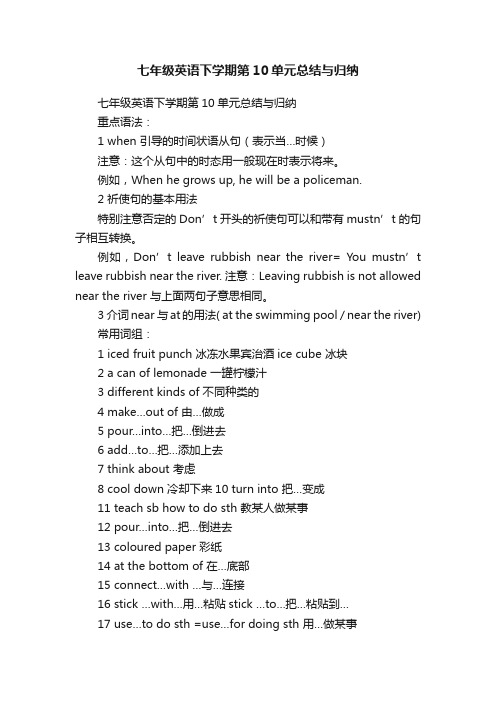
七年级英语下学期第10单元总结与归纳七年级英语下学期第10单元总结与归纳重点语法:1 when 引导的时间状语从句(表示当…时候)注意:这个从句中的时态用一般现在时表示将来。
例如,When he grows up, he will be a policeman.2 祈使句的基本用法特别注意否定的Don’t 开头的祈使句可以和带有mustn’t的句子相互转换。
例如,Don’t leave rubbish near the river= You mustn’t leave rubbish near the river. 注意:Leaving rubbish is not allowed near the river 与上面两句子意思相同。
3 介词near 与at的用法( at the swimming pool / near the river)常用词组:1 iced fruit punch 冰冻水果宾治酒ice cube 冰块2 a can of lemonade 一罐柠檬汁3 different kinds of 不同种类的4 make…out of 由…做成5 pour…into…把…倒进去6 add…to…把…添加上去7 think about 考虑8 cool down 冷却下来10 turn into 把…变成11 teach sb how to do sth 教某人做某事12 pour…into…把…倒进去13 coloured paper 彩纸14 at the bottom of 在…底部15 connect…with …与…连接16 stick …with…用…粘贴stick …to…把…粘贴到…17 use…to do sth =use…for doing sth 用…做某事18 have to do sth 不得不做某事(客观上必须做某事)19 is/ are/ am not allowed( to do sth) 不被允许(做某事)is / are/ am allowed to(to do sth)被允许(做某事)20 play with 玩耍21 leave rubbish 扔垃圾22 start with 以…开始23 be ready 准备好be ready for sth/ be ready to do sth 准备做某事get ready for =prepare for为…做好准备24 the outside of …的外部;…的表面重点词汇:1 form n. 形态;形式form v. 形成;构成2 second n. 秒/ 序数词3 freeze v. 使冻结,结冰(froze, frozen)frozen food 冷冻食品freezing weather 寒冷的天气4 safe adj. 安全的n. 保险箱save v. 挽救safely adv. 安全地safety n.安全5 allow v. 允许;准许allow sb to do sth 允许某人做某事6 outside n. 外部;外面the outside ofoutside prep. 在…范围之外;adv. 在外面7 happen v. 发生重点句式:1 What happens when…? 当…时候时发生什么?2 It’s your turn. 该轮到你了/ It’s his turn. / It’s her turn. / It’s our turn.难点辨析:by和with 表示“用…”区别1)表示使用有形的工具时,通常用with来表示。
- 1、下载文档前请自行甄别文档内容的完整性,平台不提供额外的编辑、内容补充、找答案等附加服务。
- 2、"仅部分预览"的文档,不可在线预览部分如存在完整性等问题,可反馈申请退款(可完整预览的文档不适用该条件!)。
- 3、如文档侵犯您的权益,请联系客服反馈,我们会尽快为您处理(人工客服工作时间:9:00-18:30)。
Unit 10 I’d like some noodles.
短语归纳
1.would like 想要
2.take one’s order 点菜
3.beef soup 牛肉汤
4.one bowl of… 一碗……
5.what size 什么尺寸
6.mapo tofu with rice 带米饭的麻婆豆腐
7.what kind 什么种类
8.small / medium / large bowl 小 / 中 / 大碗
9.green tea 绿茶
10.orange juice 橘汁
11.around the world 世界各地
12.birthday cake 生日蛋糕
13.the number of… 的数量
14.make a wish 许个愿望
15.blow out 吹灭
16.in one go 一口气
e true 实现
18.cut up 切碎
用法集萃
1.would like + sth. 想要某物
2.would like + to do sth. 想要做某事
3.Why don’t you + do sth.? 何不做某事?
4.the number of + 名词复数
…… 的数量,a number of + 名词复数许多……典句必背
1. What kind of noodles would you like? 你想要哪种面条?
2. I’d like beef noodles, please.我想要牛肉面。
3. What size would you like?
你想要多大的?
4. I’d like a medium bowl, please.我想要一个中碗的。
5. Would you like a large bowl? 你想要一个大碗的吗?
6. Yes, please.
好吧。
7. If he or she blows out all the candles in one go, the wish will come true.
假如他或她一口气吹灭所有的蜡烛,愿望将实现。
话题写作
My Favorite Food
I’m a middle school student. I like to eat he althy food. I have milk, eggs and bread for breakfast. For lunch I would like rice, fish and vegetables. I like chicken, juice, rice and hamburgers for supper. Of all the food, my favorite food is chicken and apple juice.。
